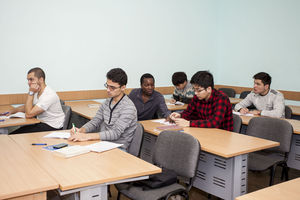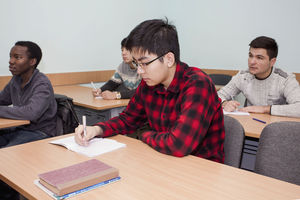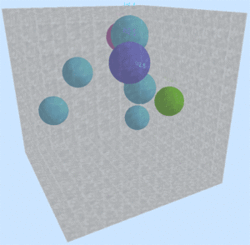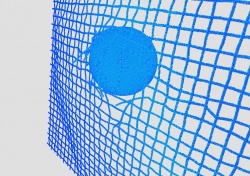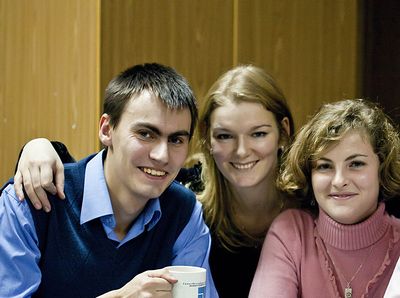Difference between revisions of "International Master Degree Program"
| Line 32: | Line 32: | ||
'''Duration and format''' | '''Duration and format''' | ||
| − | The course lasts two years of full-time study on a contract basis. | + | The course lasts for two years of full-time study on a contract basis. |
The Double Degree Program with [http://www.ibnm.uni-hannover.de/en/ Leibniz University Hanover] (LUH) and [http://www.lut.fi/en/ Lappeenranta University of Technology] (LUT). Short-term (2 months) internships at [http://www.tu-harburg.de/ Hamburg University of Technology] (TUHH) and LUH, long-term (6 months – 1 year) internships at LUT. | The Double Degree Program with [http://www.ibnm.uni-hannover.de/en/ Leibniz University Hanover] (LUH) and [http://www.lut.fi/en/ Lappeenranta University of Technology] (LUT). Short-term (2 months) internships at [http://www.tu-harburg.de/ Hamburg University of Technology] (TUHH) and LUH, long-term (6 months – 1 year) internships at LUT. | ||
| Line 99: | Line 99: | ||
==Teaching methods== | ==Teaching methods== | ||
| − | + | The world famous professors are invited to give short- and long-term courses. An individual training plan based on the students’ scientific interests provides a wide choice of case studies, cross-cultural team work, expert workshops, study visits to enterprises and internships at research centers and companies of St. Petersburg. Special resources of SPbPU, the supercomputing center and digital fabrication laboratory “Fab Lab Polytech” will be available for students. Every student enrolled in MSc program “Mechanics and Mathematical Modeling” is offered to study a semester abroad at European universities. | |
'''Program Staff''' | '''Program Staff''' | ||
| − | [[Anton Krivtsov| Prof. Anton M. Krivtsov]], Head of | + | [[Anton Krivtsov| Prof. Anton M. Krivtsov]], Head of Department "Theoretical and Applied Mechanics" |
| − | [http://www.ipme.ru/ipme/labs/he/indeng.htm Prof. Dmitry A. Indeitsev], Scientific Advisor of the Institute for Problems in Mechanical Engineering of Russian Academy of Sciences | + | [http://www.ipme.ru/ipme/labs/he/indeng.htm Prof. Dmitry A. Indeitsev], Scientific Advisor of the Institute for Problems in Mechanical Engineering of Russian Academy of Sciences |
| − | [http://www.ipme.ru/ipme/labs/dms/prive/ivanova/ElenaIvanovaENG.htm Prof. Elena A. Ivanova] | + | [http://www.ipme.ru/ipme/labs/dms/prive/ivanova/ElenaIvanovaENG.htm Prof. Elena A. Ivanova] |
[http://scholar.google.com/citations?user=Ge1nBMwAAAAJ&hl=en Prof. Alexey V. Porubov] | [http://scholar.google.com/citations?user=Ge1nBMwAAAAJ&hl=en Prof. Alexey V. Porubov] | ||
| Line 117: | Line 117: | ||
[[O.S. Loboda| Dr. Olga S. Loboda]] | [[O.S. Loboda| Dr. Olga S. Loboda]] | ||
| − | [[:ru: Vitaly Kuzkin| Dr. Vitaly A. Kuzkin]] | + | [[:ru: Vitaly Kuzkin| Dr. Vitaly A. Kuzkin]] |
[[:ru: Igor Berinskii| Dr. Igor E. Berinskii]] | [[:ru: Igor Berinskii| Dr. Igor E. Berinskii]] | ||
| Line 125: | Line 125: | ||
[[Александр Аневич Ле-Захаров| Dr. Alexander A. Le-Zakharov]] | [[Александр Аневич Ле-Захаров| Dr. Alexander A. Le-Zakharov]] | ||
| − | [[Panchenko Artem| MSc Artem Yu. Panchenko]] | + | [[Panchenko Artem| MSc. Artem Yu. Panchenko]] |
| − | [http://www.ibnm.uni-hannover.de/en/institute/the-team/professors/nackenhorst/ Prof. Udo | + | [http://www.ibnm.uni-hannover.de/en/institute/the-team/professors/nackenhorst/ Prof. Dr.-Ing. Udo Nackenhorst] |
| − | Dr. Wenzhe Shan | + | Dr.-Ing. Wenzhe Shan |
| − | Prof. | + | Prof. Dr.-Ing. Sergiy Antonyuk |
Prof. Matti Alatalo | Prof. Matti Alatalo | ||
| Line 138: | Line 138: | ||
| − | '''Laboratories and equipment''' | + | '''Laboratories and equipment''' |
1. '''''Laboratory of the Department of Theoretical Mechanics''''': supercomputers, 3D-model of the crystal structures, models of machines and mechanisms | 1. '''''Laboratory of the Department of Theoretical Mechanics''''': supercomputers, 3D-model of the crystal structures, models of machines and mechanisms | ||
| − | 2. '''''Fab Lab Polytech''''': milling machines | + | 2. '''''Fab Lab Polytech''''': milling machines, cutting machine, 3D-printers, laser cutter and engraver, cutting plotter, laser machine, bending machine, bandsaw |
| − | 3. Studio '''''"Photomechanics"''''': | + | 3. Studio '''''"Photomechanics"''''': high-speed video and photomicrography and photographic equipment. |
| − | == | + | == PhD programs == |
| − | The following graduate courses are offered at [[Main Page|Department of Theoretical Mechanics]]: | + | The following graduate courses are offered at [[Main Page|Department of Theoretical and Applied Mechanics]]: |
* '''Theoretical Mechanics (01.02.01)'''; | * '''Theoretical Mechanics (01.02.01)'''; | ||
* '''Solid Mechanics (01.02.04)'''; | * '''Solid Mechanics (01.02.04)'''; | ||
| Line 154: | Line 154: | ||
The possible research topics are listed [[Suggested_research_topics | here]]. | The possible research topics are listed [[Suggested_research_topics | here]]. | ||
| − | To sign up for an interview, write to | + | To sign up for an interview, write us an email to loboda_o<math>@</math>mail.ru, kspfrolova<math>@</math>gmail.com |
== Key facts == | == Key facts == | ||
| − | '''Admission requirements''': | + | '''Admission requirements''': Applicants are required to hold a Bachelor’s, Specialist’s or Master’s degree in the related subject area. Applicants should demonstrate English language proficiency at B+ level |
| − | '''Admission tests''': examination in the field of mechanics and interview in English with program coordinator ( | + | '''Admission tests''': An examination in the field of mechanics and an interview in English with a program coordinator (in person or via Skype) |
| − | '''Admission procedure''': written | + | '''Admission procedure''': An applicant must complete a written online application. The application deadline is June 30. |
| + | The applicants may find additional information at the official website of SPbPU: www.eng.spbstu.ru | ||
| − | '''Semester | + | '''Semester Begin Date''': September 1 (Fall Semester) |
[[File: 2 10.39.41.jpg|400px|right|]] | [[File: 2 10.39.41.jpg|400px|right|]] | ||
| Line 172: | Line 173: | ||
'''Degrees awarded''': Master of Science (MSc) | '''Degrees awarded''': Master of Science (MSc) | ||
| − | '''Tuition fees''': | + | '''Tuition fees''': 250 000 RUB per year for foreign students and 220 000 RUB per year for Russian students |
== Contact details == | == Contact details == | ||
Revision as of 10:24, 4 February 2016
Contents
MSc in Mechanics and Mathematical Modeling
Institute of Applied Mathematics and Mechanics
Program supervisor: Prof. Anton M. Krivtsov, DSc, Head of the Department of Theoretical Mechanics
The MSc program is led by the top-ranked professors of the Institute of Mathematics and Mechanics, St. Petersburg Polytechnic University, as well as the top European technical universities. The underlying concept of MSc “Mechanics and Mathematical Modeling” is to provide the students with a balanced combination of the fundamental knowledge and practical skills in mechanics to model various phenomena in physics, social sciences, biology, economy, etc. All lectures and seminars are delivered in English.
Objective of the program
The program is aimed at training highly professional scientists and engineers with the background and practical experience in theoretical mechanics, computational mechanics, IT, mathematical modeling and simulations, and distributed computing. The MSc program also develops leadership, analytical, cross-cultural and organizational skills. Upon graduation, the participants will acquire practical skills and fundamental knowledge for professional career development in international engineering or research companies.
Key advantages
1. The graduates will have an opportunity to work in research institutes, centers and laboratories. They will be able to find employment at R&D and engineering departments of oil and gas, car-making, power and engineering, or aerospace industries among others.
2. The balanced combination of the theoretical courses in mechanics and mathematics with the practical exercises, workshops and IT training sessions, simulations and distributed computing.
3. Unique opportunities for international academic mobility: a semester abroad at one of SPbPU partner universities.
4. An unrivalled opportunity for Russian and international students to participate together in SPbPU academic and extracurricular activities.
5. Support for the students' individual research project and technical ideas.
Program structure
Duration and format
The course lasts for two years of full-time study on a contract basis. The Double Degree Program with Leibniz University Hanover (LUH) and Lappeenranta University of Technology (LUT). Short-term (2 months) internships at Hamburg University of Technology (TUHH) and LUH, long-term (6 months – 1 year) internships at LUT.
Program content
Compulsory courses, MSc thesis. The compulsory lecture courses and MSc Thesis are included into the syllabus.
1st semester (30 credits)
- Computational mechanics
- Nonlinear Dynamics
- Mathematical Methods in Mechanics
- Tensor Calculus
- Biomechanics
- Advanced Problems in Mechanics
2nd semester (30 credits)
- Statistical Physics
- Mechanics of Multi-Component Media
- IT in Mechanics
- Mechanics of Thin Shells
- Advanced Modeling in Mechanics
- Research Seminar
3rd semester (30 credits)
4th semester (30 credits)
Scientific and Research work
The scientific work includes two research areas: Mechanics of Discrete Media and Mechanics of Continuum Media.
The research in the area of Mechanics of Discrete Media proceeds in the joint laboratory of the Department of Theoretical Mechanics and Institute of Problems in Mechanical Engineering of Russian Academy of Sciences. Scientists of the Discrete Models in Mechanics laboratory deal with different fundamental modern problems of mechanics, such as formulation of fundamental laws of mechanics of discrete media, development of interparticle interactions laws, defining properties of discrete media at different scale levels, establishing the relationship between parameters and properties of discrete media. Analytical and computer methods allow to describe thermomechanical properties of crystalline, amorphous and nanostructured materials and shock wave processes in solids; dynamics of granular media; fracture and structural phase transitions, chemical processes; astrophysical processes; sociological processes; biological evolutionary processes, etc.
The research in the direction of Mechanics of Continuum Media is connected with construction of new models of continuum media for description of various physical processes and phenomena. Analytical and computer models proposed by the department staff describe thermal conductivity, internal friction, electromagnetic phenomena, interaction of electromagnetic fields with matter, phase transformations, chemical reactions, fracture, deformation of thin-walled structures and nano-objects. In particular, researchers propose new models of particles with a complex structure and internal degrees of freedom, as well as thermomechanical processes based on models of thermal conductivity and hyperbolic thermoelasticity; develop fundamentals and methods of experimental mechanics, models of solid-state transitions and transitions from liquid to gas; describe the influence of the form of the strain state and material parameters on the kinetics of new phase formation, and the development of interfaces and chemical reactions fronts in deformable materials.
Also the Department conducts applied investigations for leading Russian research organizations, e.g. reliability of nuclear power plants; inertial navigation and sports biomechanics, modeling of oil and gas production, modeling of coke formation in the path of liquid rocket engines, thermal, electrical and strength analysis of aluminum electrolytic cells, development of methods for thin-walled structures calculations, high-speed video and photomicrography, etc.
Teaching methods
The world famous professors are invited to give short- and long-term courses. An individual training plan based on the students’ scientific interests provides a wide choice of case studies, cross-cultural team work, expert workshops, study visits to enterprises and internships at research centers and companies of St. Petersburg. Special resources of SPbPU, the supercomputing center and digital fabrication laboratory “Fab Lab Polytech” will be available for students. Every student enrolled in MSc program “Mechanics and Mathematical Modeling” is offered to study a semester abroad at European universities.
Program Staff
Prof. Anton M. Krivtsov, Head of Department "Theoretical and Applied Mechanics"
Prof. Dmitry A. Indeitsev, Scientific Advisor of the Institute for Problems in Mechanical Engineering of Russian Academy of Sciences
Prof. Dr.-Ing. Udo Nackenhorst
Dr.-Ing. Wenzhe Shan
Prof. Dr.-Ing. Sergiy Antonyuk
Prof. Matti Alatalo
Prof. Gennady Mishuris
Laboratories and equipment
1. Laboratory of the Department of Theoretical Mechanics: supercomputers, 3D-model of the crystal structures, models of machines and mechanisms
2. Fab Lab Polytech: milling machines, cutting machine, 3D-printers, laser cutter and engraver, cutting plotter, laser machine, bending machine, bandsaw
3. Studio "Photomechanics": high-speed video and photomicrography and photographic equipment.
PhD programs
The following graduate courses are offered at Department of Theoretical and Applied Mechanics:
- Theoretical Mechanics (01.02.01);
- Solid Mechanics (01.02.04);
- Mathematical Modeling, Numerical Methods and Software Complexes (05.13.18).
The possible research topics are listed here.
To sign up for an interview, write us an email to loboda_omail.ru, kspfrolovagmail.com
Key facts
Admission requirements: Applicants are required to hold a Bachelor’s, Specialist’s or Master’s degree in the related subject area. Applicants should demonstrate English language proficiency at B+ level
Admission tests: An examination in the field of mechanics and an interview in English with a program coordinator (in person or via Skype)
Admission procedure: An applicant must complete a written online application. The application deadline is June 30. The applicants may find additional information at the official website of SPbPU: www.eng.spbstu.ru
Semester Begin Date: September 1 (Fall Semester)
Length of program: 2 years
Degrees awarded: Master of Science (MSc)
Tuition fees: 250 000 RUB per year for foreign students and 220 000 RUB per year for Russian students
Contact details
Peter the Great St. Petersburg Polytechnic University
Dr. Olga Loboda, Program Coordinator
29, Polytechnicheskaya str., University building, 195251 St. Petersburg
Telephone: +7 952 247 40 33
E-mail: loboda_omail.ru, kspfrolovagmail.com
TAGS: Master Mechanics. Master Engineering. Master Russia. MS program.
